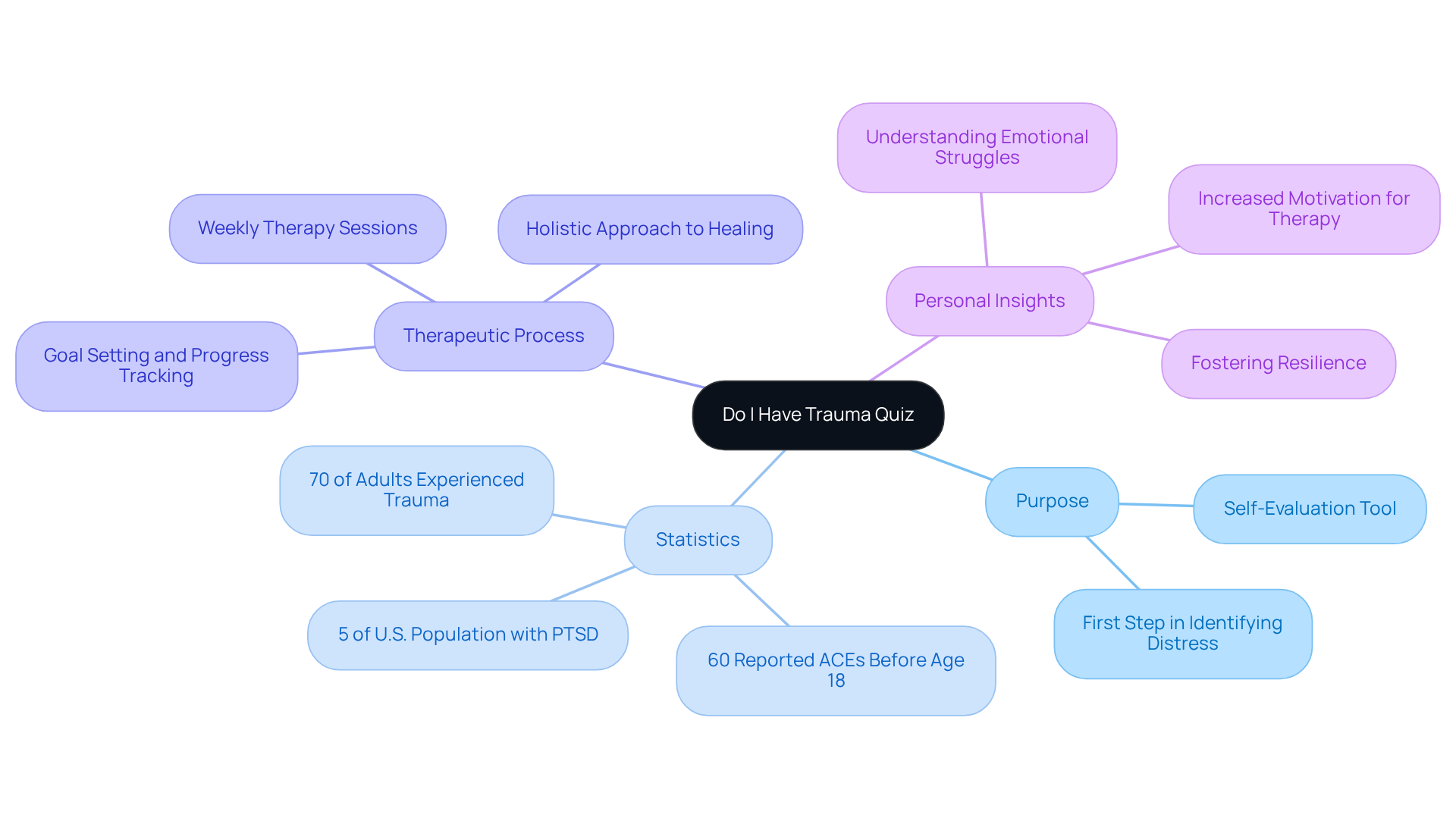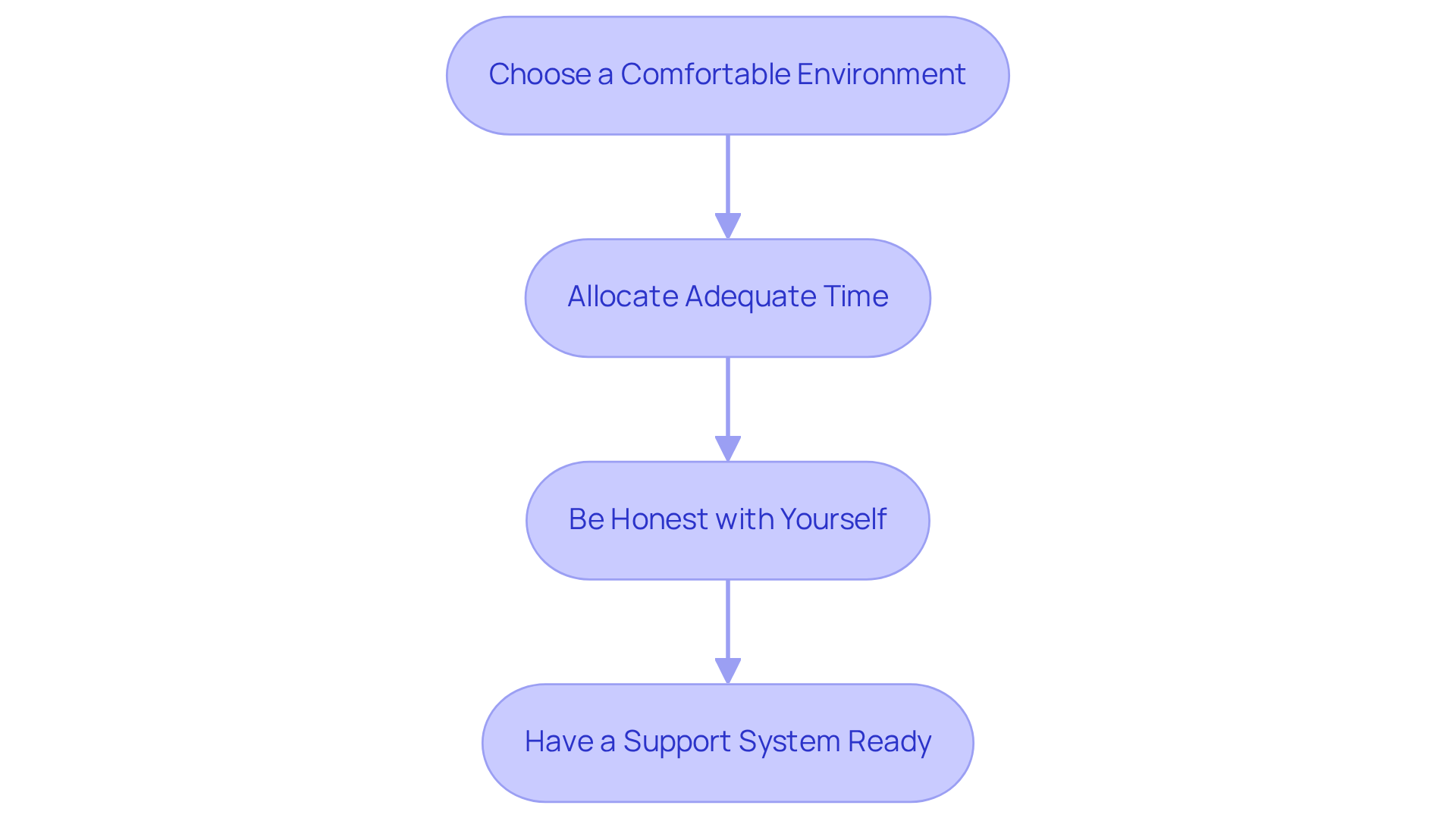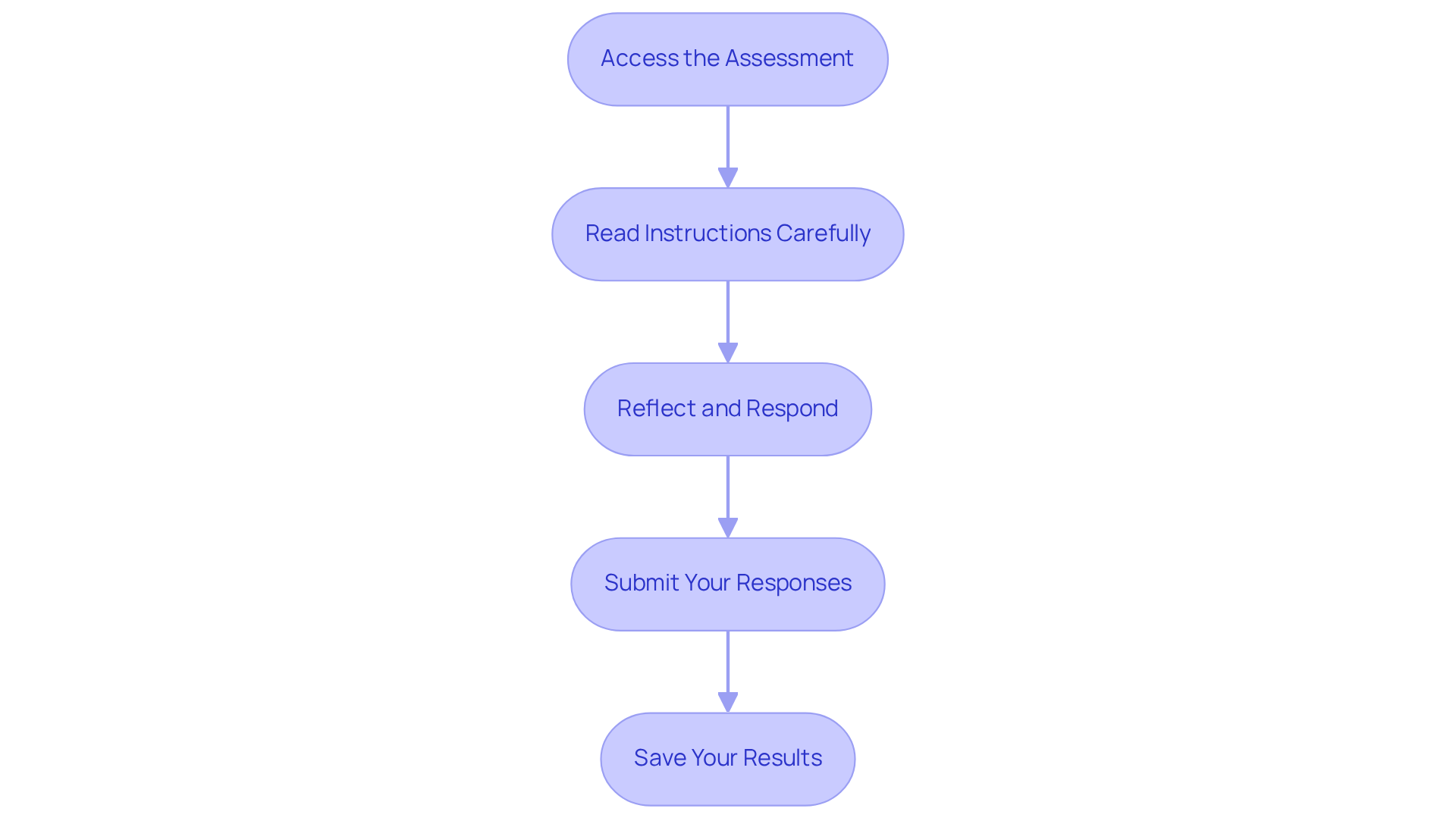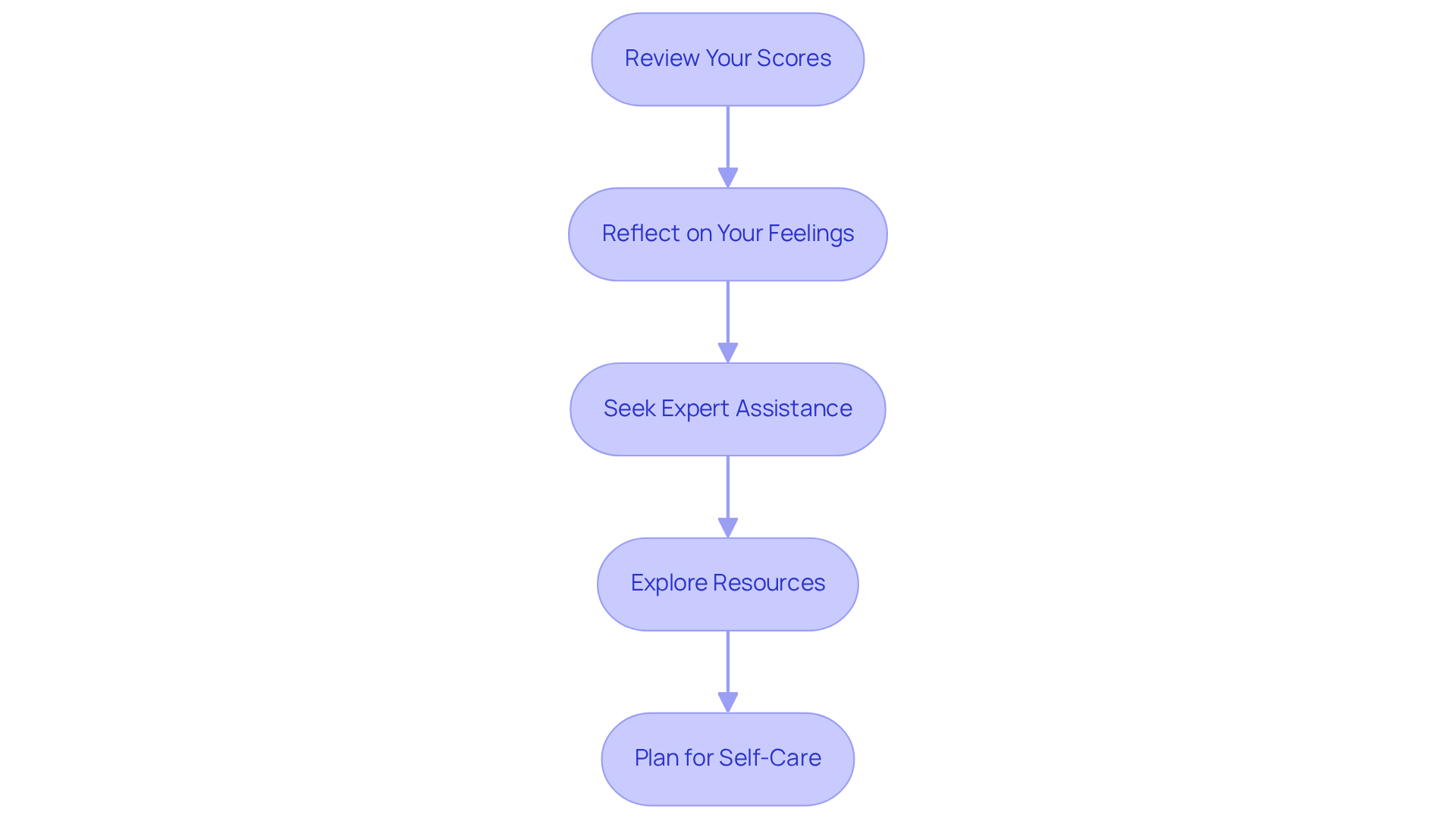Overview
To take the 'Do I Have Trauma Quiz' effectively, it's important to create a comfortable environment. Have you ever felt overwhelmed by your past? Allowing yourself sufficient time and being honest with your feelings are essential steps in this process. Additionally, having a support system ready can make a significant difference. These preparations foster a nurturing atmosphere for self-reflection, enhancing the accuracy of your responses. As you explore your emotional state, remember that this journey can pave the way for healing and professional support if needed.
Introduction
Recognizing the impact of trauma is essential in our world today, where nearly 70% of adults in the U.S. have faced at least one traumatic event. Have you ever felt overwhelmed by your past? The 'Do I Have Trauma Quiz' serves as a crucial self-assessment tool, empowering individuals to uncover their emotional struggles and take that vital first step toward healing.
As we explore this further, how can you approach this quiz effectively to gain the most insight? This guide outlines essential steps to prepare, complete, and interpret the quiz results, paving the way for a deeper understanding of mental health and your journey toward recovery.
Understand the Purpose of the 'Do I Have Trauma Quiz'
The 'Do I Have Trauma Quiz' is a valuable self-evaluation tool that assists individuals in recognizing symptoms associated with distress and related mental health conditions. By answering a series of thoughtfully crafted questions, participants can gain crucial insights into their emotional and psychological well-being. While this quiz is not a diagnostic tool, it represents an important first step in , enabling individuals to pursue professional assistance when needed.
Current statistics reveal that approximately 70% of adults in the U.S. have experienced at least one traumatic event in their lives, with over 60% reporting at least one type of Adverse Childhood Experience (ACE) before turning 18. This prevalence underscores the importance of recognizing distress symptoms, especially for high achievers who often struggle to prioritize their own needs over work or family responsibilities. Acknowledging these symptoms is essential for recovery, as they can significantly impact emotional well-being and overall quality of life.
Psychologists emphasize that acknowledging distress is a transformative process. As one expert wisely noted, 'Trauma creates change you don’t choose. Healing is about creating change you do choose.' This perspective highlights the importance of taking proactive steps toward recovery, a core principle at The Emerald Couch. Clients typically begin therapy with weekly appointments to establish a foundation for healing, collaboratively setting goals to track progress and adjust the pace of treatment as needed.
Practical examples illustrate the effectiveness of assessments in providing insights into mental health. Many individuals have shared that completing the 'Do I Have Trauma Quiz' has aided them in better understanding their emotional struggles, which in turn has led to a greater motivation to pursue therapy and support. By fostering an understanding of distress signs, the assessment not only promotes personal development but also cultivates resilience in the face of challenges, particularly for those who feel overwhelmed, anxious, or burnt out. At The Emerald Couch, we are dedicated to offering personalized therapy solutions that cater to your unique journey toward wellness.

Prepare for the Quiz: Steps to Take Before You Start
To effectively prepare for the trauma quiz, consider these nurturing steps:
- Choose a Comfortable Environment: Have you ever felt overwhelmed by your past? Selecting a quiet, private space free from distractions can make a world of difference. A serene setting allows for deeper reflection and honest responses, which are crucial for gaining accurate insights into your experiences.
- Allocate Adequate Time: It's essential to ensure you have ample time to complete the assessment without feeling hurried. This approach enables you to thoughtfully consider each question, leading to more meaningful answers and a greater understanding of your feelings.
- Be Honest with Yourself: Approach the assessment with an open mind and a commitment to honesty. Authentic replies will provide the most precise understandings of your psychological well-being, aiding you in grasping the influence of previous experiences on your current state.
- Have a Support System Ready: Anticipate that the assessment may evoke difficult emotions. Having a trusted friend or therapist available for support afterward can provide comfort and facilitate discussion about any feelings that arise.
By following these steps, you can create a supportive environment for taking the do i have trauma quiz. Ultimately, this preparation enhances your and paves the way for healing.

Complete the Quiz: Step-by-Step Instructions
To effectively complete the 'Do I Have Trauma Quiz', please follow these gentle steps:
- Access the Assessment: Start by visiting a reputable website that hosts the assessment. It is important to choose a trusted source to ensure the quality and reliability of the questions you will encounter.
- Read Instructions Carefully: Before diving in, take a moment to read any provided instructions thoroughly. Understanding how to approach the questions in the is essential for an accurate self-assessment. Have you ever felt uncertain about how to express your feelings? This step can help clarify that.
- As you reflect on your feelings and experiences, take your time responding to each question in the do I have trauma quiz. Allow yourself the necessary space to consider each item thoughtfully, as this will enhance the accuracy of your results. Remember, this is about you and your journey.
- Submit Your Responses: Once you have answered all questions, submit your responses according to the provided directions. Some assessments may offer immediate feedback, while others might require a bit of patience for results. It's okay to take your time with this process.
- Save Your Results: If possible, save or print your results for future reference. This can be particularly beneficial if you plan to discuss your findings with a therapist, as it can serve as a valuable starting point for your therapeutic journey. Remember, taking this step is a courageous move towards healing.

Interpret Your Results: Next Steps After the Quiz
After completing the do I have trauma quiz, it is important to interpret your results with care. Here are some steps to guide you:
- Review Your Scores: Take a moment to examine the scores or feedback provided. Elevated scores may indicate that I need to take a do I have trauma quiz to explore trauma-related symptoms further. Understanding these can be vital for your .
- Reflect on Your Feelings: Consider how the results resonate with your current emotional state. Do they align with your lived experiences? This reflection can provide valuable insights into your feelings and reactions as you consider taking a do I have trauma quiz.
- Seek Expert Assistance: If your results from the do I have trauma quiz indicate significant distress, it is crucial to reach out to a psychological specialist for a thorough evaluation and support. Remember, you are not alone; studies show that around 27% of adults sought psychological health care in 2022, highlighting the importance of professional help.
- Explore Resources: Utilize available resources like articles, support groups, or therapy options to deepen your understanding of trauma and its effects. Engaging with these resources can offer valuable insights and coping strategies.
- Plan for Self-Care: Regardless of your results, prioritize self-care practices that nurture your mental well-being. Activities such as mindfulness, exercise, or engaging in hobbies can enhance your emotional resilience and overall health. Remember, self-care is a vital component of healing and recovery.

Conclusion
Taking the 'Do I Have Trauma Quiz' is a significant step towards understanding your emotional and psychological health. This self-evaluation tool serves as a gateway for you to recognize potential signs of distress, encouraging you to seek professional help when necessary. By engaging with this quiz, you embark on a journey of self-discovery and healing, emphasizing the importance of prioritizing mental wellness in your life.
As we explore this further, key steps have been highlighted to ensure an effective quiz-taking experience:
- Preparing a comfortable environment
- Allowing sufficient time for reflection
- Approaching the questions with honesty
- Having a support system in place
These strategies enhance the likelihood of gaining meaningful insights. Moreover, understanding the results and knowing when to seek professional assistance can significantly impact your mental health journey.
Ultimately, the process of taking the 'Do I Have Trauma Quiz' is not just about answering questions; it is about fostering awareness and initiating healing. By taking these proactive steps, you can better understand your emotional challenges and cultivate resilience. This journey towards mental health is vital, as it empowers you to take control of your well-being and seek the support you deserve.
Frequently Asked Questions
What is the purpose of the 'Do I Have Trauma Quiz'?
The 'Do I Have Trauma Quiz' is a self-evaluation tool designed to help individuals recognize symptoms associated with distress and related mental health conditions. It provides insights into emotional and psychological well-being.
Is the 'Do I Have Trauma Quiz' a diagnostic tool?
No, the quiz is not a diagnostic tool. It serves as an important first step in identifying possible signs of distress, encouraging individuals to seek professional assistance if needed.
What percentage of adults in the U.S. have experienced trauma?
Approximately 70% of adults in the U.S. have experienced at least one traumatic event in their lives, and over 60% have reported at least one type of Adverse Childhood Experience (ACE) before turning 18.
Why is it important to recognize symptoms of distress?
Recognizing symptoms of distress is essential for recovery, especially for high achievers who may neglect their own needs. Acknowledging these symptoms can significantly impact emotional well-being and overall quality of life.
What do psychologists say about acknowledging distress?
Psychologists emphasize that acknowledging distress is a transformative process. Healing involves creating change that individuals choose, as opposed to the changes trauma imposes.
How does therapy typically begin at The Emerald Couch?
Clients typically begin therapy with weekly appointments to establish a foundation for healing, collaboratively setting goals to track progress and adjust the pace of treatment as needed.
How has the 'Do I Have Trauma Quiz' helped individuals?
Many individuals have found that completing the quiz has helped them better understand their emotional struggles, leading to increased motivation to pursue therapy and support.
What is the overall goal of the 'Do I Have Trauma Quiz' and therapy at The Emerald Couch?
The overall goal is to foster an understanding of distress signs, promote personal development, and cultivate resilience, particularly for those feeling overwhelmed, anxious, or burnt out.




